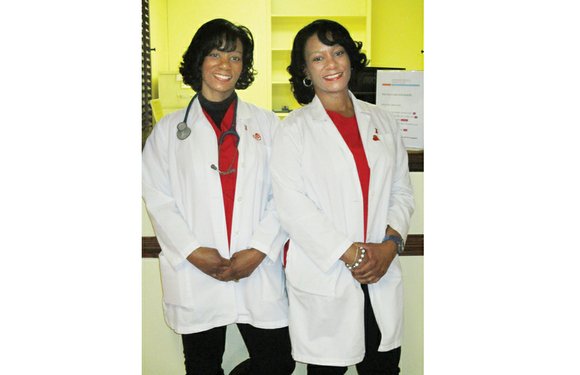Twins lend voices, expertise to healthy heart education
Joey Matthews | 3/25/2016, 1:53 a.m.

Fraternal twins Kimberly Ketter and Shaun Rivers share a deep faith and a desire to help others. And they aspire to live life to its fullest.
“We play hard and we work hard,” Ms. Ketter told the Free Press in a recent interview with her sister. “We are passionate about what we do.”
The 47-year-old Varina residents are best friends and nurses who work together, worship together and have many of the same friends.
They now also share roles as American Heart Association Heart Failure Patient Ambassadors.
Along with five other heart failure survivors, they joined a newly established national team in October 2015 of survivors and caregivers living with the impact of heart failure.
They are serving as the public faces of a multiyear national initiative called “Rise Above Heart Failure.” Its mission is to raise awareness of heart failure risks and symptoms and to reduce heart failure hospital re-admissions, according to Michelle McLees, a spokesperson with the Mid-Atlantic affiliate of the American Heart Association.
As ambassadors, “we accept the responsibility to teach others at the local and national level how to recognize the symptoms of heart failure, to offer support through the Rise Above Heart Failure online network and to share with our own communities that they can live with heart disease,” Ms. Rivers said.
The siblings shared their survivor stories at the AHA’s national conference in Chicago last October, then again at the association’s Mid-Atlantic Go Red for Women fundraising luncheon in February as part of American Heart Month events.
Ms. Ketter said she first suspected something was wrong in May 2009, when she became short of breath and fatigued after walking up the steps at her home.
At first, she said, “I kind of brushed it off.”
The next day, she became ill at her job. She went to her family doctor, then to a cardiologist. A battery of tests that included walking on a treadmill revealed she had heart failure.
“My heartbeat wasn’t contracting as it should,” Ms. Ketter recalled.
She teared up, she said, realizing the seriousness of her condition.
It was “hard to believe that I had heart failure because I didn’t have high blood pressure or diabetes” and “I was a former athlete in high school,” she said.
Concerned that the condition might be genetic, Ms. Ketter encouraged her sister to get tested. Two weeks later, Ms. Rivers also was diagnosed with heart failure.
“We both went through a period of denial,” Ms. Rivers said. “We were young and active and it was hard to believe it could happen to us.”
She said they both “went through a period of grieving, which is a part of reaching acceptance that this is real and it’s something we have to face head-on.”
Research, Ms. Rivers said, shows that African-Americans experience almost double the rate of heart failure as others. Some of that she attributes to hypertension and high-cholesterol diets.
Today, the sisters said they take medicine each day to treat their heart failure. They also follow a healthy diet, exercise regularly and rest when necessary.
“We keep a very rigorous calendar,” Ms. Rivers said. “It looks like a road map. You just take it one day at a time and look at what you have to do today.”
“You can live with heart failure,” Ms. Ketter added. “You just do what you have to do.”
The siblings ascribe much of their success in living with heart failure to their faith in God.
“We know we couldn’t do it without leaning on God to sustain us,” Ms. Rivers said, “and to give us the resolve to help other people first and not ask, ‘Why is this happening to us?’ ’’
The women said they have slowed a bit in pursuing their busy daily schedules.
It’s difficult to see that when one looks at their nearly nonstop efforts to help others and live a full life.
Ms. Ketter is a nurse practitioner. Ms. Rivers is an advanced diabetes clinical nurse specialist.
Last fall, they opened Case Management Associates in Petersburg, a diabetes wellness center. They also are diabetes program coordinators at the Vernon J. Harris Medical Center in Richmond’s East End.
They also lead a health ministry at St. Paul’s Baptist Church in Henrico County, where they worship and work with church leaders to educate congregants on healthy eating habits and to offer healthy food choices at the church.
The siblings also are active in the AHA’s Empowered to Serve initiative that aims to improve health in multicultural communities by partnering with faith-based organizations.
“Once we got past the initial shock of knowing we had heart failure, we thought, ‘What can we do to help other people who might face the same thing?’ ’’ Ms. Ketter said.
“Now, we know that God sends us people who we can help, perhaps one more person in the 35- to 40-year-old age range who won’t unnecessarily drop dead from heart failure.”
She said their mantra now is, “If people know better, they’ll do better.”
For those who might experience some of the symptoms of heart failure, which include shortness of breath, excessive fatigue and leg swelling, Ms. Rivers offered the following advice.
“You know your body better than anybody else. Know what your best day feels like and when you don’t have that type of day, be aware of that. And when you experience those symptoms, make a beeline to a doctor and don’t put it off.”







